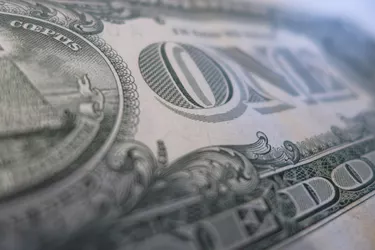
A collapse of the dollar would not be a good thing for the U.S. economy, or the world's, but there might be a bit of a silver lining for people who owe money. Debt wouldn't be eliminated by a dollar collapse, but repaying it would get easier. That's because when a dollar loses nearly all its value, then $100 or $1,000 or $100,000 isn't worth much either.
What "Collapse" Means
Video of the Day
When economists talk about a currency such as the dollar "collapsing," they're referring to a sudden, steep decline in the value of that currency, to the point where it's worth only a tiny fraction of its previous value. For people using the currency, the collapse manifests itself in hyperinflation -- extreme price increases. Whereas today an apple might cost $1, next week it might cost $10, and the week after that, $20. It's not that the apple has gotten more valuable; it's that the dollar got less valuable. Today, $1 pays for a whole apple; next week, maybe a couple bites' worth.
Video of the Day
Wage-Price Spirals
Currency collapses have produced astounding images of people using stacks of money for the smallest purchases and of governments printing banknotes in ridiculously high denominations, such as the 100-trillion-dollar bill that Zimbabwe printed in the 2000s (and which, according to "The Wall Street Journal," still wouldn't even pay for local bus fare). During a currency collapse, hyperinflation locks an economy into a "wage-price spiral," in which higher prices force employers to pay higher wages, which they pass on to customers as higher prices, and the cycle continues. Meanwhile, the government cranks out currency to meet demand, making inflation even worse. This spiral can make it impossible for anyone to keep up with inflation, but it does have one benefit for debtors -- it makes it easier to pay off debt.
Repaying Debt in Devalued Dollars
Imagine you had a mortgage with $100,000 left on it, and your income was $50,000 a year. Now the dollar collapses, hyperinflation results and the wage-price spiral pushes your income to, say, $1 million a year. (This represents roughly 2,000 percent inflation, relatively modest as far as currency collapses go; in Zimbabwe, the annual inflation rate in 2008 was 231 million percent.) But your mortgage is still $100,000, because hyperinflation doesn't change debt balances. Before the collapse, it would have taken two years' worth of wages to pay off your mortgage; now it takes less than a month. In general, inflation is good for debtors, since it reduces the real value of what they owe, and bad for savers, since it reduces the real value of their savings. The hyperinflation from a collapse of the dollar would intensify these effects.
No More Lending
If the dollar collapses and runaway inflation results, it may get easier to pay off existing debt, but it's also going to be extremely difficult, and costly, to engage in any new borrowing. Inflation benefits borrowers at the expense of lenders. In times of high inflation, lenders charge high interest rates to try to stay ahead of the dwindling value of the money they've lent out. Amid hyperinflation, if they're willing to make loans at all, lenders would be expected to set astronomical interest rates. And they might not be willing in any case. Amid hyperinflation, money can lose value so fast that the only rational thing to do is to spend it -- to turn it into something of value -- rather than lend it.